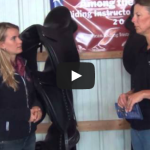In domesticating the horse, we created a few problems for him. One of these problems is parasites. Or in plain language – worms. Its actually natural for a horse to have some parasites living inside him. But the problems begin when the horse has too many worms – a high parasite load.
Then the horse’s health can be affected, sometimes in a mild way by the horse losing appetite, having difficulty gaining weight, or losing his shiny hair coat. Other times the effects of parasites may be more severe, resulting in damage to the digestive system, colics, or intense itching and rubbing.
As horse owners and caretakers, we receive a lot of conficting advice on how to best handle these worms. We are told to use a certain brand, rotate chemicals, deworm every 8 weeks, do fecal testing, etc, etc.
In order to get the facts on the worm issue, I made a trip back to Penn State University to interview Dr. Ed Jedreweski, DVM, Horse Barn Manager.
Dr Ed answered three questions for us:
1. Why do we have to worry about parasites?
2. What should we be doing about them?
3. How do we develop a personalized plan for each horse?
Click Here to watch the interview and learn why the goal is not “getting rid of parasites, but keeping the horse healthy.”
In the comments below, tell us – what are you currently doing for parasite control? What might you do differently now?
See you in the comments,
Callie














3 Responses
We’ve always managed our parasite control by picking horse droppings at least once a day in the stalls and runs, and we always make sure to get all the droppings in our pastures picked up daily as well! Our horses are out all day every day (in large “sacrifice” area or pasture) and put in their open backed stalls with 60 foot runs during the night. If you get rid of the poop you prevent parasite eggs from hatching and being ingested by grazing horses. I read that the eggs in a pile of poop takes about 3 days to hatch but we make sure to pick any droppings as soon as we see it! Droppings left in places where horses graze can spread millions of eggs. I hope that all horse owners are made aware of the benefit of just plain good pasture management to prevent parasites from multiplying and contaminating pastures. I believe if we, as horse stewards, can prevent horses becoming loaded with parasites just by picking up poop, then we all should do the best we can. The other benefit is not having to give the horse oral toxins any more than necessary to control the parasite loads. I assume Dr. J. will cover “picking poop” and other pasture management ideas (like spreading droppings…good or bad?) to help horse owners, as well. Thanks for a great interview on a very important subject!.
Judy Weinmann
Callie thanks for this interview which I found very interesting and informative.
Callie thanks for the interesting discussion on deworming and resistance. I think it’s very interesting to hear his approach and makes perfect sense. Right now I’m currently just worming twice a year in the fall I use praziquantel + Ivermectin such as equimax or zimectrin gold, and in the spring around February I use Quest Plus. This seems to cover most classes of parasites. And do fecals as well throughout the year to see how we’re doing.